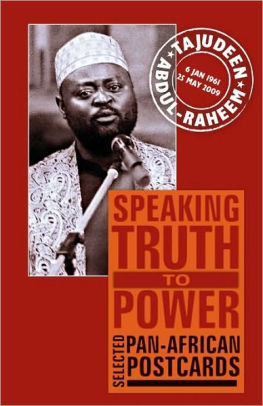8TH PAC & LEGACY OF TAJUDEN ABDUL RAHEEM

Tajudeen Pic
Tajudeen was born in Funtua, Katsina state, Nigeria in January 1961. Excelling in educational system Tajudeen could not be contained and he graduated from Bayero State University with first class honors. After graduating he earned a Rhodes Scholarship to study at Oxford University in the United Kingdom. Tajudeen challenged his Rhodes Scholarship interviewers by bluntly reminding them about the horrible legacies of Cecil Rhodes in Africa. Tajudeen used his years in Oxford to earn his doctorate in political science and while he was a student, he built networks, working in different formations dedicated to change. Whether it was in the anti-apartheid formations, the formations to support the peoples of Palestine, the anti-dictatorial struggles in West Africa or the global peace and justice movement, Tajudeen emerged as a force and a voice for good.
He was known in all the political circles in London before the Abdul Rahman Babu requested his service within the Pan African movement.
Tajudeen was a builder and hard worker who threw himself into the tasks of organizing the 7th Pan African Congress. His level of energy was manifest in the organization of the 7th Pan African Congress in Kampala in 1994. It was a meeting that brought out all of the contradictions between the old variants of Pan Africanism, the question of the place of Sudan in the Pan African movement and most importantly, the centrality of the grassroots women in the movement for freedom. It was in Kampala where the Pan African Women’s Liberation Organization (PAWLO) was formed.
The Kampala meeting introduced Pan Africanists to the challenges of transcending divisiveness, genocidal thinking and narrow racial conceptions of who is an African. The Rwanda genocide accelerated on the last day of the 7th Pan African conference and Pan Africanists were forced to take a principled stand on genocide and genocidal violence. This genocide and the ensuing wars that engulfed Central Africa consumed the energies of Tajudeen for many years. He was on first name basis with Laurent Kabila, Yoweri Museveni, Meles Zenawi and other leaders. Working for peace he penetrated the limitations of these leaders.
Tajudeen was diplomatic and pragmatic. He understood the limitations of many of the leaders of Africa, especially the Ugandan leadership, but he remained in Kampala as General Secretary of the Pan African Movement, in so far as he felt that Pan Africanists had to work from African soil. This was a principled position that he took at the time of the congress in 1994.
A living example of what Walter Rodney wrote about when he observed that the task of the black intellectual was to place himself or herself at the service of the people, Tajudeen committed himself to dignity – dignity of all people. He committed himself to this principle and he involved himself in organizing, and he organized at different levels.
His mantra was “Don’t Agonize, Organize.”
Tajudeen spent his time with the most oppressed and also had a vision. That vision was a free Africa, a united Africa and African people creating spaces where they can be creative and change the planet in which we live, and these features of the life of Tajudeen are features that we hope that younger people will emulate as we go through the tribulation of the present moment.
Tajudeen worked tirelessly to build the African Union and worked within the Economic, Social and Cultural Council of the African Union (ECOSOCC). Afer Tajudeen left Uganda in 2004, he was employed as Deputy Director of United Nations Millennium Campaign in Africa.
From a little office at the All African Conference of Churches in Nairobi with minimum staff, Tajudeen mobilized 7 million people to stand up against poverty in Africa. This was just a demonstration of what we can do if we stood up for Pan-African unity, peace and reconstruction. One clear task is to work for the unity of the peoples of Africa. It is the culture of standing up that we are here to celebrate. It is a culture that draws from the depths of our ancestors who have left traditions of resistance.
In 2007 Tajudeen worked with Pan Africanists all over Africa to push the debate on the Union government of Africa. At the AU summit in Ghana the leaders rejected the idea of full unification and instead worked for regional integration based on regional bodies.
Tajudeen Abdul Raheem died in a car crash in Nairobi leaving a great loss in the wider Pan African world. This loss was even greater for his immediate family, his wife Mounira Chaieb and two daughters Aisha and Aida. A thinker and writer but above all a mighty talker and doer, he inspired and influenced a whole generation of Africans and Africanists with his mixture of passion and humor.
Useful links on Tajudeen Abdul Raheem
Speaking Truth to Power: Selected Pan-African Postcards by Tajudeen Abdul Raheem
Tajudeen Will Turn the Angels Into Pan Africanists
Tributes to Tajudeen, Special issue of Pambazuka News
Tajudeen Abdul Raheem, A Giant is lost on African Liberation Day
Tajudeen Abdul-Raheem and the tasks of Pan-Africanists
Tribute To Tajudeen Abdul Raheem by Horace Campbell
Remembering Tajudeen Abdul Raheem, Speaking Truth to Power
No Country is Enough by Jibrin Ibrahim
A True Pan African Leader Speaking Truth to Power
Tajudeen Abdul-Raheem: Respected Pan Africanist, Campaigning Journalist and Editor
Your Memories: Tajudeen Abdul-Raheem